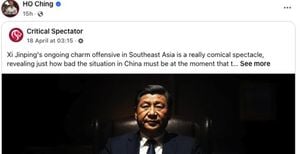On April 22, 2025, President Claudia Sheinbaum Pardo delivered strong remarks against Mexican politicians advocating for foreign intervention to address domestic issues. During her morning press conference, she specifically targeted members of the National Action Party (PAN) who have urged the U.S. government to classify drug cartels in Mexico as terrorist organizations. Sheinbaum asserted that historically, it has been conservatives who have sought assistance from outside the country to resolve internal problems, stating, "In Mexico, we resolve our issues ourselves."
Sheinbaum's comments were made in response to questions from the media regarding her earlier statements during the commemoration of the 111th anniversary of the Gesta Heroica del Puerto de Veracruz, held the day before. At this event, she emphasized the valor of naval cadets and soldiers who resisted foreign occupation in 1914, reinforcing her view that seeking external help is a betrayal of national sovereignty. "Only traitors are in favor of seeking foreign help to solve our internal problems!" she exclaimed, highlighting her firm stance against any perceived subordination to foreign powers.
Moreover, the president referenced proposals from Xóchitl Gálvez Ruiz, a candidate from the PAN, suggesting the creation of binational forces to combat crime. Sheinbaum criticized such suggestions, reiterating that Mexico must handle its own affairs without foreign interference. "We cooperate, we coordinate, we share information and intelligence, but in Mexico, we are the ones who act," she emphasized, drawing a clear line between collaboration and intervention.
Sheinbaum also touched upon Mexico's diplomatic relations, noting that while they are generally positive with most countries, tensions have arisen, particularly with Ecuador. This tension escalated after the invasion of the Mexican embassy in Ecuador in April 2024, leading to a diplomatic rift. Sheinbaum stated that her administration has consistently rejected any notion of U.S. military involvement on Mexican soil, a sentiment echoed by many in her government.
In her address, Sheinbaum underscored the importance of national pride and sovereignty, stating that no revolutionary leader in Mexico's history, including figures like Emiliano Zapata and Pancho Villa, accepted help from the United States. This historical reference served to bolster her argument against foreign intervention, framing it as a matter of national dignity and self-determination.
As the U.S. has ramped up military presence along the border, Sheinbaum's administration has responded with a diplomatic note expressing concerns about potential infringements on Mexico's sovereignty. "We have said many times that it is better for the United States to participate in our territory; we have said no to that," she remarked, reiterating her administration's commitment to resolving security issues independently.
In addition to her comments on foreign intervention, Sheinbaum announced plans to propose a reform aimed at prohibiting the dissemination of foreign government propaganda in Mexico. This initiative was prompted by the recent airing of anti-immigrant advertisements by the U.S. government on Mexican television. Sheinbaum's proposal reflects her administration's broader strategy to protect Mexican sovereignty and prevent foreign influence in domestic affairs.
The commemoration event on April 21 featured a floral tribute, a salute of honor, and a roll call of fallen heroes, particularly honoring the cadets of the Heroica Escuela Naval Militar. During this ceremony, Sheinbaum reaffirmed the legacy of those who fought against foreign occupation, linking it to contemporary issues of national identity and sovereignty.
"Today, we live in a special moment in our relationship with the United States," Sheinbaum noted, highlighting the deep economic ties between the two nations. Approximately 40 million Mexicans reside in the U.S., while over a million Americans call Mexico home. "We do not compete; we complement each other," she added, underscoring the interdependence of the two economies.
As tensions continue to rise over security issues and foreign influence, Sheinbaum’s administration remains steadfast in its commitment to upholding Mexico's sovereignty. Her recent statements reflect a broader narrative of nationalism and self-reliance, resonating with many Mexicans who value independence from foreign intervention.
In summary, President Claudia Sheinbaum's recent remarks underscore her administration's dedication to resolving Mexico's internal challenges without external assistance. Her strong stance against foreign intervention, alongside proposals to ban foreign propaganda, highlights a significant moment in Mexico's political landscape as the country navigates complex relationships with its neighbors while striving to maintain its sovereignty and integrity.





